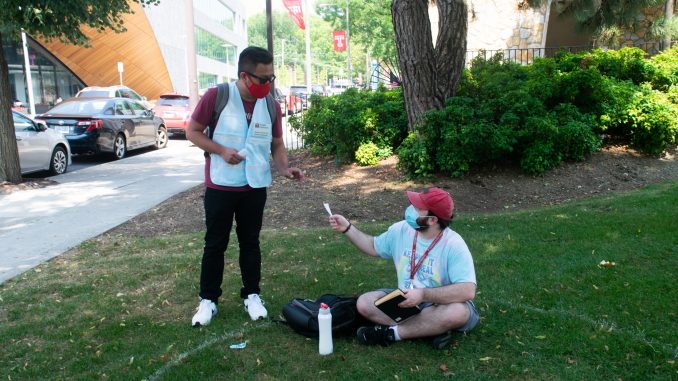
Temple University recruited a group of student workers to help encourage social distancing guidelines on campus as in-person learning continues this fall.
The university launched its Student Community Health Ambassador program on Aug. 17 with 40 student workers tasked with patrolling Main Campus to remind students of Temple’s four public health “pillars”: wearing face coverings, practicing social distancing, hand-washing frequently and self-monitoring for COVID-19 symptoms.
“You just go around your assigned zone and greet people, thank them for wearing a mask,” said Japheth Gueco, a student ambassador and junior information science and technology major. “If they’re not wearing a mask, you tell them kindly or remind them to practice social distancing and wear a mask properly.”
Wearing blue vests, ambassadors are assigned to patrol one of six zones between Cecil B. Moore Avenue and Diamond Street to the north and 11th Street and 15th Street to the west.
Ambassadors are only permitted to use positive reinforcement, not disciplinary action, when encouraging students to follow the university’s four pillars. Students who ignore an ambassador’s reminder will not be punished, said Leah Hetzell, director of International Student Affairs.
“With this summer’s social justice uprising, we did not want there to be any kind of enforcement or police connection,” said Tina Young, event coordinator at the Howard Gittis Student Center who serves as a supervisor to the student workers in the program. “We wanted it to be students showing that they care about their fellow students to stay healthy.”
Ambassadors reward students they see following the university’s health guidelines with tickets redeemable for prizes at the Howard Gittis Student Center’s information desk, said Kim Celano, associate director of the Student Center. These prizes include hand sanitizers, hats, T-shirts, ID wallets, phone holders, pins and buttons.
“I really like the job because I get to interact with people,” Gueco said. “I get to help the community be safe, help prevent the virus from spreading around campus.”
Temple created the program in part to provide employment for student workers who were furloughed because of the COVID-19 pandemic, Hetzell said. Students in the School of Sport, Tourism and Hospitality Management and the College of Public Health also have the option to participate in the program for academic internship credit.
The program is set to end on Nov. 20, when Temple will halt in-person instruction and operations on Main Campus and complete the remaining weeks of the semester online. Hetzell is hopeful the university will be able to offer the ambassadors their original student worker positions by the Spring 2021 semester.
“We want to help the students,” Hetzell said. “We know that students are depending on jobs right now, so we don’t just want to be like ‘Oh hey, by the way, it’s just going to end,’ and then goodbye.”
As of Wednesday, 10 to 15 more students are in training to join the 40 currently serving as ambassadors, Celano said. Their training took place virtually and included programming from Student Health Services, the Wellness Resource Center, Campus Safety Services and the Office of Institutional Diversity, Equity, Advocacy and Leadership.
The program hopes to eventually employ between 60 to 90 ambassadors throughout the semester, Hetzell said.
During the semester, ambassadors are scheduled to work in shifts on weekdays from 8:30 a.m. to 5:30 p.m with 10- to 15-minute breaks in an indoor space if needed. Ambassadors are also provided with protective gear like masks and hand sanitizer.
“We all want to get back to campus,” Young said. “We all want to be with our peers and our co-workers, and that’s only going to happen if people model the four health pillars.”


Be the first to comment